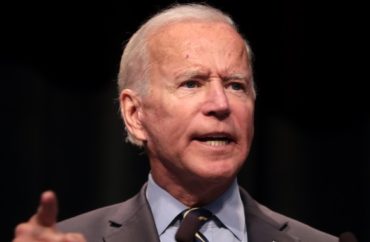
Scholars argue Biden student loan bailout on shaky legal ground in College Fix interviews
The Biden administration has massively scaled back the eligibility on its student loan bailout plan as it faces mounting legal questions and challenges.
“As of Sept. 29, borrowers who have federal student loans that are owned by private entities and not by the Department of Education will no longer qualify for the relief program,” the Epoch Times reported, adding the decision was made “on the same day that six Republican-led states filed a lawsuit against President Joe Biden, claiming his student loan forgiveness plan is illegal.”
Last week, Iowa, Kansas, Missouri, Nebraska, South Carolina and Arkansas filed a lawsuit against the $500 billion student loan bailout, accusing the plan of overstepping executive powers, the Associated Press reported.
The Republican states argue Biden’s cancellation plan is “not remotely tailored to address the effects of the pandemic on federal student loan borrowers,” AP reported.
Additionally, another lawsuit was filed against the bailout late last month. The lawsuit challenges the legality of the plan, created without following the normal steps for issuing new regulations or initiatives.
In fact there’s several legal arguments that can be made against Biden’s student loan bailout, according to two prominent scholars in interviews with The College Fix.
Professor Ilya Somin, an expert in constitutional law at George Mason University’s Antonin Scalia School of Law, said one of the chambers of Congress could challenge the Biden student-loan forgiveness in court, as could financial institutions responsible for servicing the loans.
The easiest pathway to blocking Biden’s executive order “would probably be to file a lawsuit against it and win,” he told The College Fix in a recent telephone interview.
Hillsdale College economic policy Professor Gary Wolfram, author of the 2005 CATA analysis “Making College More Expensive: The Unintended Consequences of Federal Tuition Aid,” said he questions whether Biden has the authority to forgive the loans under the 10th Amendment.
“There is some question about whether he has the authority to do it, or would Congress have to do it,” he said in a recent telephone interview with The College Fix.
“There are two things about it. One is: Does government have the authority to even engage in a program like this, it basically says if it’s not an enumerated power, the government doesn’t have the authority, but we have thrown that out the window.”
Somin, in his interview, cited loan servicers as a strong contender as a plaintiff in a lawsuit against the Biden administration, arguing they face real damages.
“Some of them would have lower profits than they would otherwise. That would be enough to prove that the action harmed them so they could file a lawsuit, and if they were to prevail, a court could issue an injunction against the policy,” Somin said.
A loan servicer “reports loan payment, collects the monthly payment and penalties on late payment, releases liens, makes certain that insurance and taxes are paid and initiates foreclosure proceedings for loans in default,” according to USLegal.com, a law website.
Under Biden’s order, companies contracted to manage government-provided student-loans lose revenues they expected to collect over the remaining life of the loans, Somin said.
Wolfram said the situation could also be viewed through the lens of executive power.
“Congress is the one that set up the loans,” he said, “can the executive branch just eliminate it?”
“I am not an expert enough to know whether that is true or not but there is certainly a question on whether it is illegal, because it was Congress that set up the student loans under congressional authority. Can the executive branch say, ‘You don’t have to pay it back?'”
The Biden administration argued exactly that in a memorandum written by U.S. Assistant Attorney General Christopher Schroeder.
“The waiver or cancellation of student debt does not require drawing money from the Treasury; it entails a waiver of the right to collect money that is owed to the United States,”Schroeder wrote. “We have no concern that our interpretation might create a violation of the Appropriations Clause.”
As also explained in the memorandum, the U.S. Department of Education claims power to forgive student-loans under the 2003 Higher Education Relief Opportunities for Students (HEROES) Act.
The legislation’s text states that the Secretary of Education “may waive or modify any statutory or regulatory provision applicable to the student financial assistance programs… as the Secretary deems necessary in connection with a war or other military operation or national emergency.”
More specifically, the administration’s memorandum points to a later section of the HEROES Act which allows the Secretary of Education to ensure that individuals affected by an emergency “are not placed in a worse position financially in relation to that financial assistance because of their status as affected individuals.”
However Professor Somin said that argument is a stretch, pointing out the sweeping, large-scale nature of Biden’s plan.
“It affects everybody who has college loans and who has an income up to $125,000 per year for an individual or $250,000 a year for a married couple,” he said. “It’s just not plausible to say that all these people, or even any kind of a majority of them, have had their ability to repay negatively affected by the pandemic.”
Somin also argued that the largesse of Biden’s order might put it at odds with the major questions doctrine, recently used by the U.S. Supreme Court to overturn other actions by the executive branch.
Under the major question doctrine, courts are required to verify that Congress clearly gave the executive branch power to act in a given manner, and ambiguity in legislation does not guarantee the executive extensive authority.
“I think when you look at the relevant provision in the HEROES Act, and perhaps in other laws which people have suggested the administration can cite, at the very least it’s ambiguous whether Congress really did delegate to the president the vast power to forgive hundreds of billions of dollars of loans to huge numbers of people,” Somin said.
“Under the major questions doctrine, courts have to assume that Congress did not delegate that power.”
He said a single house of Congress can also sue unilaterally, but a lawsuit from a Democratic-controlled House or Senate is unlikely.
Moreover, in response to the bailout, Republican U.S. Senator Josh Hawley has introduced legislation called “Make the Universities Pay Act” which, if approved, would require colleges and universities to pay 50 percent of student loan balances that go into default.
MORE: Bill would force universities to repay portion of student loan default
IMAGE: Numena Studios / Shutterstock





Please join the conversation about our stories on Facebook, Twitter, Instagram, Reddit, MeWe, Rumble, Gab, Minds and Gettr.